Super User
Industrial technology company reveals new temperature controllers
~ Watlow’s controllers optimize performance and reduce complexity ~
Industrial temperature controller manufacturer Watlow has released its LEGACY™ SERIES panel-mount (PM) temperature controllers, which are designed to optimize performance using a simple control and menu functionality. The range includes the industry first 1/32 DIN controller, which incorporates Bluetooth technology to enable EZ-LINK™, Watlow’s mobile application for setting up, monitoring and adjusting its temperature controllers.
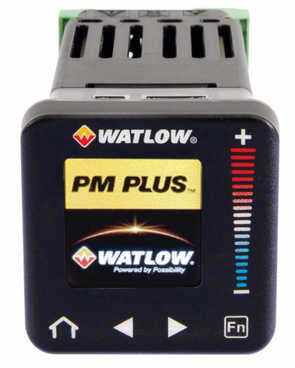 The LEGACY controllers, which can be used in medical, clinical, analytical and food industry applications, simplify the complexity often associated with PM controllers. The controllers offer many benefits including proportional integral derivative (PID) auto-tune for fast and efficient startup, a touch-safe package for increased operator safety, SMOOTHTOUCH™ keypad to eliminate contamination points and create a better seal on the front panel, while a function key provides simple, one-touch operations of user defined, repetitive activities.
The LEGACY controllers, which can be used in medical, clinical, analytical and food industry applications, simplify the complexity often associated with PM controllers. The controllers offer many benefits including proportional integral derivative (PID) auto-tune for fast and efficient startup, a touch-safe package for increased operator safety, SMOOTHTOUCH™ keypad to eliminate contamination points and create a better seal on the front panel, while a function key provides simple, one-touch operations of user defined, repetitive activities.
Standard bus communications are also available on LEGACY SERIES controllers, allowing easy product configuration via PC communications protocol and free software — saving time, simplifying programming, and improving reliability of controller setup.
All LEGACY SERIES controllers are compatible with Watlow’s EZ-LINK mobile app that connects via Bluetooth. This includes the sophisticated PM PLUS™ controller, designed to enhance user experience with an interface enabling easier set up, programming and readability, as well as the first 1/32 DIN controller.
“There was a need in the market for a simple controller for basic applications, so we developed the LEGACY SERIES to fulfill that void,” said Andy Borkowski, product manager at Watlow. “Earlier this year, we introduced the 1/16 DIN and now we can offer the 1/32 DIN, the first of this size in the industry to incorporate Bluetooth technology.
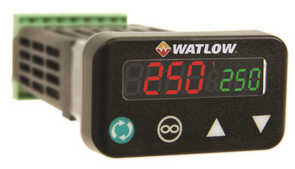 “We understand that our customers don’t always want or need the most powerful, high-end controller on the market. Some applications require basic control, and this product line is made for those situations. For example, in the design of the PM PLUS, we have reduced the complexity on the front of the controller and eliminated the dependency on cables and user manuals for configuring the product. This means the intuitive menu flow allows the controller to be easily configured.
“We understand that our customers don’t always want or need the most powerful, high-end controller on the market. Some applications require basic control, and this product line is made for those situations. For example, in the design of the PM PLUS, we have reduced the complexity on the front of the controller and eliminated the dependency on cables and user manuals for configuring the product. This means the intuitive menu flow allows the controller to be easily configured.
“This is important because, historically, PM controllers are not easy to use. These upgrades help improve user experience by addressing the needs of our customers and simplifying the way the controllers are used,” said Borkowski.
“Watlow is proud to offer the LEGACY SERIES as a practical and economical option for basic applications in a variety of industries. The LEGACY SERIES can be ordered as PID process controllers or as dedicated over and under-temperature limit controllers.”
For more information on Watlow’s range of industrial temperature controllers, visit www.watlow.com/products/controllers/.
About Watlow:
Founded in 1922, Watlow strives to be the leading provider of thermal solutions for the world’s most demanding applications. Utilizing our advanced technology, leading companies apply our thermal systems which are ideally suited for vital applications such as clean and environmentally friendly energy systems and processes, front-end semiconductor processing and lifesaving medical and clinical equipment.
Since 1922 Watlow has grown in product capability, market experience and global reach. The company holds more than 1,000 patents and employs 2,200 employees working in nine manufacturing facilities and three technology centers in the United States, Mexico, Europe and Asia. Watlow also has sales offices in 50 countries around the world. The company continues to grow, while the commitment remains the same – to provide its customers with superior products and services for their individual needs.
3t EnerMech brings world-leading training and competency solutions to Angola
3t EnerMech, a strategic alliance between 3t Energy Group and EnerMech, has launched a world-leading training and competency solution service in Angola, which is the first of its kind in the country.
The alliance, which was founded earlier this year, has also secured an international drilling contractor as its first client to benefit from its new dedicated training facility in the industrial hub of Luanda, Angola.
Launched in partnership with EnerMech’s local entity SoniMech, 3t EnerMech will provide lifting operations training and competence services, with plans already in place to extend this to cover the full 3t EnerMech portfolio in the coming months.
Januario Nhembo has been appointed as training manager to spearhead delivery at the new premises and brings more than 20 years’ experience to the role. A local Angolan, Mr Nhembo is fully accredited to deliver training and assessment across a range of disciplines including offshore crane operator stage 1-3, banksman slinger and lifting awareness.
Mr Nhembo will deliver courses in the native language of Portuguese, supporting 3t EnerMech’s commitment to upskilling the national workforce in Angola.
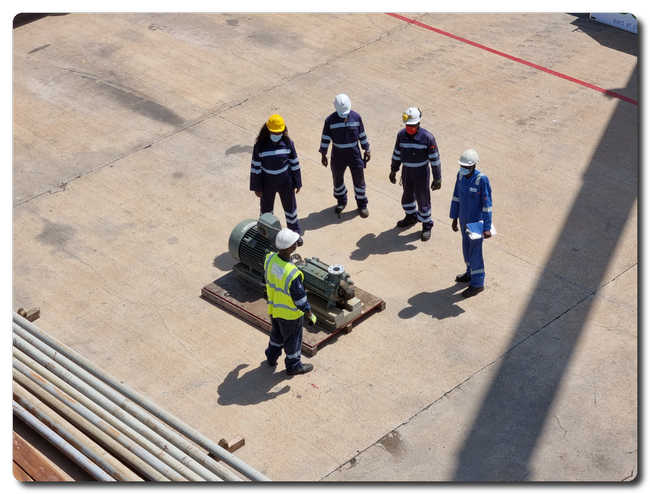
The alliance will see 3t EnerMech bring globally recognised, quality assured training capability, along-side fully customisable learning solutions that draw on a range of software and technology tools including simulation, e-learning, VR-learning, R3 spaced-repetition learning and augmented reality.
As part of the new contract, which is already in progress, a robust offshore lifting training and assessment programme will be delivered at the Kizomba deepwater development, which lies in block 15 off Angola. This will include reviewing all relevant competencies for the global contractor’s crane operators with the programme being delivered by 3t EnerMech’s skilled personnel.
The new enhanced facility at the centre of Angola’s largest port comprises classrooms, an on-site simulator and a practical facility for banksman slinger and rigger courses. The company also has the capabilities to deliver remote training to clients’ operations globally.
EnerMech’s recently appointed head of cranes and lifting for Africa, Steve Swanson, operations manager Sean Filby and office manager Eugenia Calunga, will work closely with Mr Nhembo and Rudi Schellhorn, Country manager, to grow the current service offering. The team has a combined experience of more than 50 years in the cranes and lifting industry and both Mr Swanson and Mr Filby have held several senior positions within Angola.
Ross McHardy, regional director of Europe and Africa for EnerMech said: “When we established 3t EnerMech, our core objective for the alliance was to work closely with regional clients to develop and upskill their local personnel. Being able to deliver this just a few months later in Angola is a key milestone for the business and testament to the dedication and proactivity of our combined forces.
We have formed an exceptionally strong team who have the knowledge, expertise and track-record to provide best-in-class training to our clients. This collective training and competency solution strengthens our position for future growth and expansion in the region.”
3t EnerMech vice president Andrew Noble said: “Our unique approach to training services allows clients to benefit from blended and fully customisable learning solutions ultimately creating a safer, more effective workforce trained to international standards. We are thrilled that our clients see the value in our services and look forward to supporting a more skilled and competent workforce in the country.”
3t EnerMech
Launched earlier this year 3t EnerMech, the joint venture combines the expertise of integrated solutions specialist provider EnerMech and 3t Energy Group, which owns leading energy sector training organisations 3t Transform, Drilling Systems, Survivex and AIS Training. The alliance will deliver world-leading training and competency solutions encompassing a blend of traditional training, digital learning technologies and training compliance management platforms.
SoniMech
In 2013, EnerMech entered a joint venture agreement with Sonangol Integrated Logistics Services (SONILS), the main supply base logistics arm of Angola’s national oil company Sonangol. The joint venture ‘SoniMech’ established a base in the centre of Angola’s largest commercial port, Port of Luanda and offers the major international operators a streamlined pre-commissioning package including valves, hydraulics, riser repair, cranes and process and pipeline services which had not been previously available.
EnerMech:
Formed in April 2008, EnerMech provides specialist integrated mechanical, electrical, instrumentation and integrity services to the international energy and infrastructure sectors, from pre-commissioning through operations and maintenance and late-life support/decommissioning.
The business is focused on offering a safer, more customer-focused, responsive service at lower cost, while delivering a much greater level of engineering and technical support than competitors can offer. In December 2018, EnerMech was acquired by The Carlyle Group, the NASDAQ listed global asset manager.
EnerMech specialises in providing integrated supply, operations, maintenance and engineering solutions in its core services of Cranes and Lifting, Electrical and Instrumentation, Equipment Rental, Hydraulic products and services, Industrial Services, Process, Pipeline and Umbilicals (PPU), Maintenance and Integrity Services, Training and Valve supply and services.
The group is headquartered in Aberdeen with bases in Great Yarmouth, Bristol (UK); Stavanger, Houston, Pasadena, Sulphur, Casper, Williston (USA), Guyana, Trinidad, Mexico, Abu Dhabi, Iraq, Qatar, Saudi Arabia, Azerbaijan, Kazakhstan, Singapore; Perth, Melbourne, Sydney, Brisbane, Darwin, Gladstone, Chinchilla (Australia); Malaysia, China, South Korea, India, Ghana, Nigeria, Angola, South Africa and Mozambique.
Website: www.enermech.com
3T Energy Group:
3t Energy Group was formed in 2018 and is defined by three pillars; technology, training and simulation. It combines the expertise of advanced simulator developer, Drilling Systems, leading training providers, AIS Training and Survivex and virtual reality and software specialist, 3t Transform. The group delivers industry-approved training courses to more than 75,000 people annually, employs more than 300 staff and has sites in Aberdeen, Newcastle, Bournemouth, Houston, Dubai and China. In addition to the world-class training and competency management software, e-learning and virtual reality solutions offered by 3t Energy Group, it is also market leader in drilling, well control and crane operations simulators. This includes the latest revolutionary mobile On-The-Rig (OTR) and MultiSIM simulators that drive competence assurance and compliance.
BASF Sunscreen Simulator 4.0: Now with even more functionalities
BASF’s Care Creations® has further refined the functionality and scope of its Sunscreen Simulator. The latest relaunch of the virtual laboratory now provides formulators and manufacturers with even more options for digitally defining the UV protection of a sun protection product. Sunscreen Simulator 4.0 offers an updated, customizable user interface. The new cockpit functionality guides users through the simulator and expands options for creating and managing projects and personal data. Access to helpful scientific support has also been integrated into the cockpit.
- The digital tool that supports the development of sunscreens is now even more comprehensive, with the integration of a cockpit functionality
- Integration of EcoSun Pass® criteria for direct assessment of environmental impact of selected UV filter combinations
- Evaluation of the interaction of UV filters and emollients
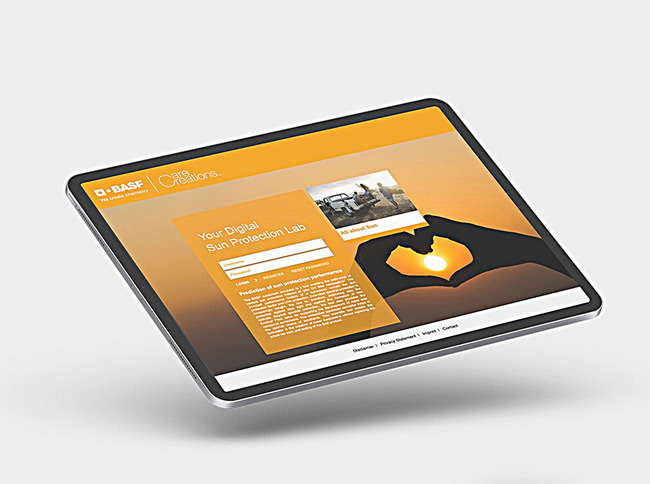 Sunscreen Simulator 4.0 now provides even more options for digitally defining the UV protection of a sun protection product.
Sunscreen Simulator 4.0 now provides even more options for digitally defining the UV protection of a sun protection product.
"The integration of the EcoSun Pass® is a tremendous step forward for formulators. In addition to UV performance, they can now also directly check the environmental impact of the selected UV filter systems," explains Dr. Myriam Sohn from the Global Technical Center Sun Care.
The BASF Sunscreen Simulator serves as a recognized benchmark in the industry for determining the sun protection factor (SPF). In addition to the known performance parameters (SPF, UVA protection, photostability), it is now also possible to perform calculations to protect against blue light irradiation and the generation of free radicals.
The Solubilizer Simulator is also entirely new: As part of the Sunscreen Simulator it evaluates the efficacy of the combination of UV filters and emollients and provides information about the naturalness (as defined by ISO16128) of the emollients.
Further information on the Sunscreen Simulator is available on our website at: https://www.carecreations.basf.com/sunscreen-simulator
About the Care Chemicals division at BASF
The BASF division Care Chemicals offers a broad range of ingredients for personal care, hygiene, home care, industrial & institutional cleaning, and technical applications. We are the global leading supplier for the cosmetics industry as well as the detergents and cleaners industry, and support our customers with innovative and sustainable products, solutions and concepts. The division’s high-performance product portfolio includes surfactants, emulsifiers, polymers, emollients, chelating agents, cosmetic active ingredients and UV filters. We have production and development sites in all regions and are expanding our presence in emerging markets. Further information is available online at www.care-chemicals.basf.com.
About BASF
At BASF, we create chemistry for a sustainable future. We combine economic success with environmental protection and social responsibility. More than 110,000 employees in the BASF Group contribute to the success of our customers in nearly all sectors and almost every country in the world. Our portfolio is organized into six segments: Chemicals, Materials, Industrial Solutions, Surface Technologies, Nutrition & Care and Agricultural Solutions. BASF generated sales of €59 billion in 2020. BASF shares are traded on the stock exchange in Frankfurt (BAS) and as American Depositary Receipts (BASFY) in the U.S. Further information at www.basf.com.
Valmet will deliver defibrator system to Guararapes Caçador MDF plant in Brazil
Valmet will supply a new Valmet Defibrator EVO system to the Brazilian company Guararapes. The system will be used for the company´s medium density fiberboard (MDF) production as part of its major expansion at Caçador plant in Santa Catarina state. This will give Caçador the largest MDF capacity in a single plant in all of the Americas and raise the group’s MDF output. The start-up is scheduled for 2022.
The order was included in Valmet's orders received of the first quarter 2021. The value of the order will not be disclosed.
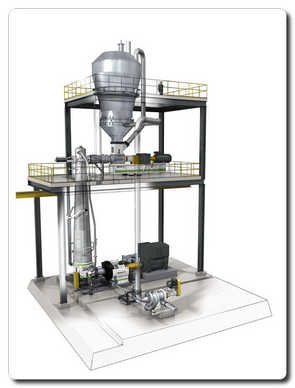 Valmet Defibrator EVO SystemThe defibrator system is the heart of the MDF plant, since the wood chips are mechanically separated there into the fibers, which has a huge influence on both the final product quality and specific energy consumption.
Valmet Defibrator EVO SystemThe defibrator system is the heart of the MDF plant, since the wood chips are mechanically separated there into the fibers, which has a huge influence on both the final product quality and specific energy consumption.
“Guararapes has been needing more MDF capacity for a long time and the pandemic has stimulated the demand even further. The new plant will be installed alongside the existing MDF lines in Caçador, which will give Brazil one of the most modern MDF plants in the world, being both highly productive and sustainable, and including the latest digital technology such as scanners to check the surface quality,” says Ricardo Pedroso, the CEO of Guararapes.
Valmet was chosen to supply the line for numerous reasons, such as several very good references in Brazil that are already installed and working. In addition, Valmet's innovations in digitalization, remote service, and high-efficiency refining convinced the customer about up-to-date technology. Furthermore, a strong service commitment from Valmet and the proactive lifecycle support strengthened the attractiveness.
“From a technological point of view, the Valmet solution is unique in terms of quality and especially energy savings. This gives the important dual financial benefits, reducing both the ongoing operation expenditure, OPEX, costs and the initial capital expenditure, CAPEX, of the entire MDF line,” says Igor Panassol, Sales Manager, Pulp and Energy business line, Valmet in South America.
Information about Valmet’s delivery
Besides the Valmet Defibrator EVO System, a Valmet Steam Separator PV system will also be supplied, which is the first reference in Latin America.
Information about Guararapes
Guararapes manufactures MDF panels and it is one of the largest plywood panel producer in Latin America. It is currently exporting its panels to over 60 nations. With the recent announcement to invest in the MDF line, the production capacity will increase to over 600.000 m³ per year, becoming one the nation’s leading MDF production companies and totaling about 1,550M m³ per year of production from forest-based panels.
Valmet is the leading global developer and supplier of process technologies, automation and services for the pulp, paper and energy industries. We aim to become the global champion in serving our customers.
Valmet's strong technology offering includes pulp mills, tissue, board and paper production lines, as well as power plants for bioenergy production. Our advanced services and automation solutions improve the reliability and performance of our customers' processes and enhance the effective utilization of raw materials and energy.
Valmet's net sales in 2020 were approximately EUR 3.7 billion. Our 14,000 professionals around the world work close to our customers and are committed to moving our customers' performance forward - every day. Valmet's head office is in Espoo, Finland and its shares are listed on the Nasdaq Helsinki.
Read more www.valmet.com
For further information, please contact:
Igor Panassol, Sales Manager, South America, Pulp and Energy business line, Valmet, tel. +554133414481
Leif Sundberg, Sales Manager, Pulp and Energy business line, Valmet, tel. +46 70 606 55 47
FutureOn awarded contract from Aker BP
FutureOn, the global software company specializing in the energy sector and creator of the award-winning SaaS field design applications, FieldAP, and its APIcentric collaboration platform, FieldTwin, has been awarded a contract from Aker BP.
The contract which is in place until April, will see Aker BP adopt FutureOn’s transformative digital twin software to digitize their workflows within Concept Development and Field Development Studies.
FutureOn’s unique field design applications, proven API-centric collaboration platforms and digital twin technology, will allow Aker BP to visualize subsea data, map the design of digital twin fields, and foster greater digital collaboration across engineering and project management disciplines during the subsea field development stage.
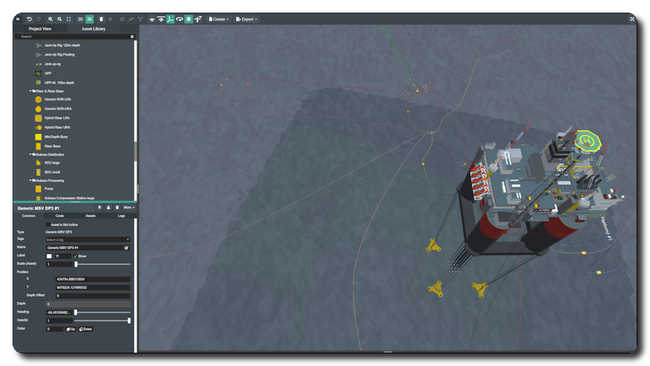
Paal Roppen, CEO of FutureOn, commented: “We are pleased to secure this significant contract with Aker BP, and that FutureOn is able to support the operator’s continued drive for increased digitalization.
“The impact of our applications is transformational, and will provide a working blueprint for the field development where design changes are instantly reflected across the entire project workscope, updates are communicated across the globe in real-time to all involved parties, which will ultimately minimize mistakes and control risk.”
About FutureOn
Experts in data visualization, FutureOn emerged from Xvision in 2016 to become a standalone provider of state-of-the-art visual engineering for the global energy sector. The company transforms the performance of complex capital projects with our cutting-edge visualization technology.
FutureOn is proud to offer its global customer base industry-leading software solutions to create digital twins that deliver a complete asset visualization and integrated data model that unlocks value through increased efficiency, improved safety, reduced costs, risk mitigation, lower emissions and increased uptime.
FutureOn technology includes:
FieldAP, a cloud-based digital platform that provides rapid visual workflows for early-stage subsea engineering work. Multiple data streams from geography to bathymetry, topography, existing infrastructure and other physical constraints can be combined with proprietary information such as reservoirs, wells and drilling to create a information-rich 3D visualization of any potential project location.
FieldTwin provides a visual representation of the entire life cycle of a field by creating and maintaining a digital twin — an exact digital copy of an oil and gas company’s physical asset — which enables producers to maximize asset performance and value.
Cobots enable effective high-mix, low-volume production
With increased competition, often on a global scale, manufacturers need to differentiate themselves by tailoring products more closely to customer demand. This, of course, carries with it an implicit reduction in batch sizes and has seen the rise of ‘high-mix, low-volume production. Cobots can enable manufacturers to effectively meet individual customer requirements with greater product variety in smaller batches. Oliver Giertz, Product Manager for Servo/Motion and robotics for the EMEA region at Mitsubishi Electric, Factory Automation, explains how collaborative robots are helping manufacturers to increase flexibility, boost quality, and drive down operational costs.
While high-volume production, with its repetitive tasks, has seen increased adoption of traditional industrial robots, we have to think differently in a high-mix production environment where the programming and reconfiguration effort to change from one product to the next can impact on productivity. In high-mix production, there might be several line changeovers needed in a given shift.
For many manufacturers, this has meant an increased reliance on manual labour. But that, in turn, increases operational costs when compared with high-volume production – and the greater the mix, the higher the emphasis on manual labour, and the greater the production cost for a given volume.
Further, high-mix, low volume (HMLV) production requires more stringent quality control processes to be put in place, with the opportunity for production errors increasing as the batch sizes reduces. At the same time, the levels of changeovers between different products can often become a bottleneck.
However, the new breed of collaborative robots (or cobots) is responding to the trend of HMLV production, delivering the required flexibility and the ability to reconfigure processes quickly as well as easily.
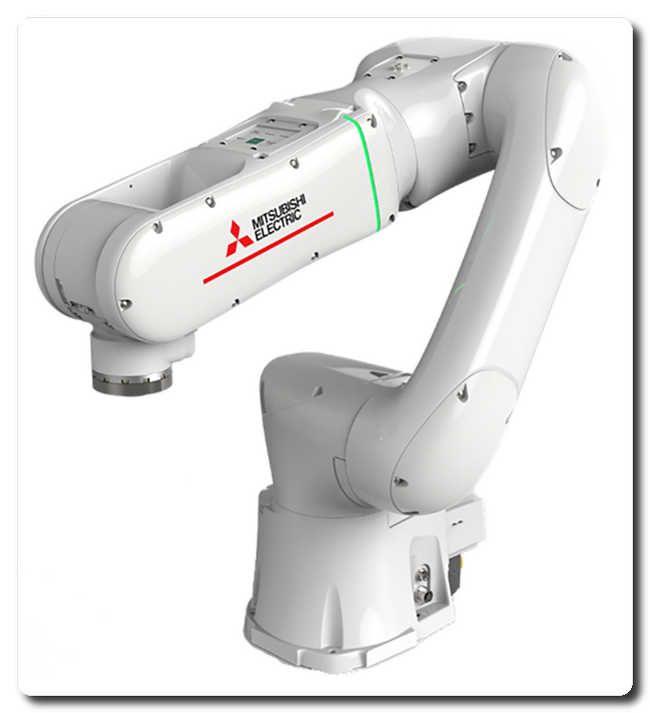 Cobots are proving a key enabler for high-mix automation while offering the maximum return on investment. (Image Source: Mitsubishi Electric Europe B.V.)
Cobots are proving a key enabler for high-mix automation while offering the maximum return on investment. (Image Source: Mitsubishi Electric Europe B.V.)
Improved flexibility, consistency and reliability
Designed to assist human operators on the shop floor, cobots can take on simple, repetitive and physically strenuous tasks. This offers improved consistency and reliability in manufacturing while enabling humans to concentrate on more complex jobs. A cobot is also flexible and can quickly learn to adapt to a variety of tasks, from picking and placing to machine tending.
A key benefit of cobots is their ease of programming, enabling frequent redeployment and fast set-up without advanced robotic programming expertise. One recent development which can improve the ease and speed of configuration is hand-guided teaching, where the cobot arm is simply moved to the desired position and added to the operational sequence at the press of a button. This technology means that no complex programming is required, and it can also be combined with touch-screen graphical interfaces to implement more sophisticated operations.
A digital twin can also be used to enhance the speed of set-up and redeployment. Employing a digital representation of the physical cobot, including the virtual capability to evaluate performance, the digital twin can simulate cobot interaction to ensure that it can safely and predictably fulfil the desired task before deployment.
This ease of programming and redeployment is one of the main enablers of HMLV production and holds the key to reducing operational costs. At the same time, the increased accuracy of the latest cobots is an important contributor to improving quality in a high-mix environment. As an example, Mitsubishi Electric’s MELFA ASSISTA cobots can provide a repeat accuracy of ±0.03mm, making them ideal even for the most delicate and precise tasks.
By moving towards HMLV production, manufacturers are finding that they can differentiate themselves from their competitors, with the ability to tailor products to specific customer requirements, even in the smallest of batches. Further, with the ability to quickly switch production to a different product, manufacturers can become more responsive to changes in the market, delivering an additional competitive advantage.
Cobots are proving a key enabler for high-mix automation while offering the maximum return on investment. In an HMLV production environment, cobots drive up flexibility and reduce operational costs.
About Mitsubishi Electric
With 100 years of experience in providing reliable, high-quality products, Mitsubishi Electric Corporation is a recognized world leader in the manufacture, marketing and sales of electrical and electronic equipment used in information processing and communications, space development and satellite communications, consumer electronics, industrial technology, energy, mobility and building technology, as well as heating, cooling and air-conditioning technology.
Embracing the spirit of its “Changes for the Better”, Mitsubishi Electric endeavours to be a global, leading green company, enriching society with technology.
With around 146,500 employees the company recorded consolidated group sales of 40.9 billion US Dollar* in the fiscal year ended March 31, 2020.
Our sales offices, research & development centres and manufacturing plants are located in over 30 countries.
Factory Automation EMEA
Mitsubishi Electric Europe B.V., Factory Automation EMEA has its European headquarters in Ratingen near Dusseldorf, Germany. It is a part of Mitsubishi Electric Europe B.V. that has been represented in Germany since 1978, a wholly owned subsidiary of Mitsubishi Electric Corporation, Japan.
The role of Factory Automation EMEA is to manage sales, service and support across its network of local branches and distributors throughout the EMEA region.
Further Information:
www.eu3a.mitsubishielectric.com/fa/
Stora Enso launches bio-based binder for safe and healthy everyday living
Stora Enso is today launching its latest lignin-based innovation, NeoLigno® by Stora Enso. NeoLigno is a fully bio-based binder system without formaldehyde and isocyanates, thus, providing healthier indoor and working environments.
Hazardous chemicals aren't always visible to the naked eye, yet they may be in homes or products used every day. Stora Enso is on a mission to replace such products with renewable materials. The new binder NeoLigno demonstrates the unique properties and potential of lignin. Lignin is nature's second most common macromolecule after cellulose. It is found in all plants and makes up to a third of the composition of wood. Lignin is a renewable raw material free from toxic substances and fully traceable to its area of origin.
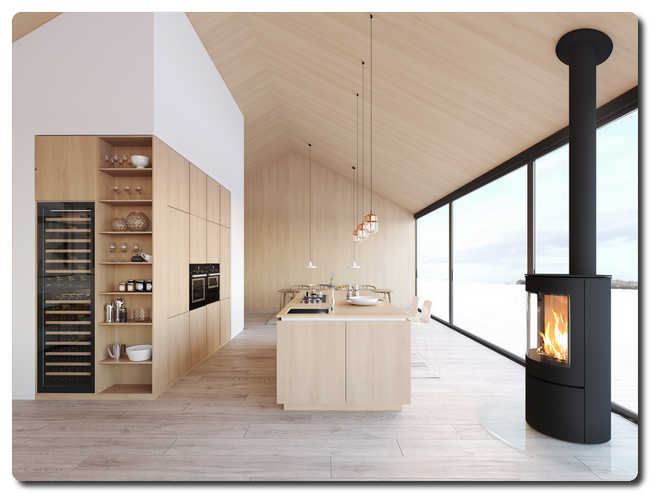
NeoLigno is a bio-based, high-performing alternative for industries currently using fossil-based binders or hazardous chemicals. Initial target applications for NeoLigno are in particleboards and insulation materials used in the building and construction industry. Additional application areas are currently being investigated.
“We are taking the lead in creating a new era of natural binders for healthy everyday living. Companies are increasingly looking for safer and more natural materials to be able to offer high quality, fully bio-based end products to their customers. NeoLigno is based on lignin from our own production. With NeoLigno, our customers can develop products that are safer to make and use without compromising on technical performance,” says Lauri Lehtonen, Head of Innovation of Stora Enso’s Biomaterials division. “NeoLigno has many benefits: It is free from formaldehyde and isocyanate; it is fully bio-based; and it offers high performance,” Lehtonen concludes.
Stora Enso has been producing lignin commercially since 2015 at its Sunila Mill in Finland.
Part of the bioeconomy, Stora Enso is a leading global provider of renewable solutions in packaging, biomaterials, wooden construction and paper. We employ some 23 000 people and have sales in more than 50 countries and our shares are listed on the Helsinki (STEAV, STERV) and Stockholm (STE A, STE R) stock exchanges. storaenso.com
Salamander Fabrications shows support for metal thefts UK clampdown
At least 1,225 UK metal thefts valued at £1.7 million have been reported since January 2019, according to figures released by the British Transport Police (BTP).
Following a Freedom of Information (FOI) request issued by sheet metal manufacturer Salamander Fabrications, BTP also stated it had made 74 arrests between the same time period of January 2019 to February 2021, in relation to the crime.
Metal thefts are reportedly costing the UK economy over £770 million per year as officers continue the fight to tackle an ongoing issue.
October 2020 alone saw BTP, and fellow nationwide forces, join the Joint Unit for Waste Crime, Historic England, Network Rail, BT and other organisations to carry out ‘coordinated enforcement action’.
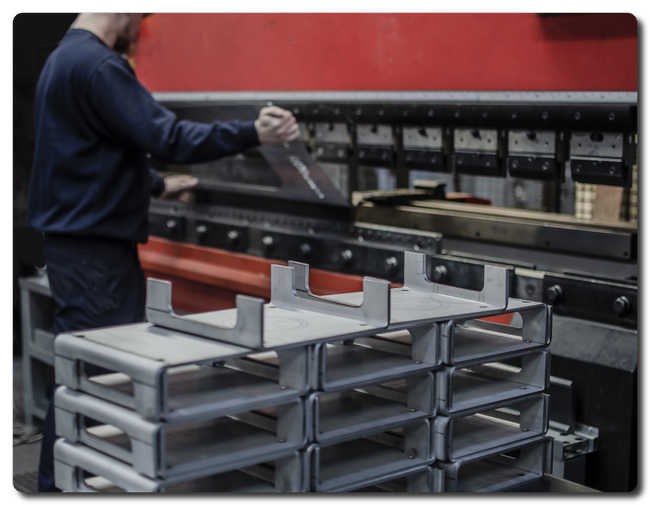
With over 50 years’ experience in sheet metal work, Huddersfield-headquartered Salamander Fabrications manufactures more than 25 tonnes of metal a week and completes large-scale projects for the rail, automotive and healthcare sectors, to name a few.
Commenting on the findings, Salamander Fabrication’s managing director, Michael Haskell, said: “We know how precious metal is and its importance for the future of the UK economy. It’s a material that has the power to connect communities, drive forward British innovation and preserve historical landmarks.
“We’re saddened that our FOI request has revealed metal theft incidents are well into their thousands. However, we also know how much authorities and relevant organisations are doing to clampdown and eradicate such criminality. We support these efforts entirely.”
In response to the figures released to Salamander, a BTP spokesperson added: “We’re working with partners across the entire country and throughout the metals recycling industry to target those who we suspect of flouting the law or operating outside their licence.
“By taking a multi-agency approach, we’re maximising our ability to identify those who are attacking our national infrastructure and historical buildings, making it harder for them to sell stolen metal and gain from their activities.”
Additional FOI information: BTP recorded 497 metal thefts from 1st January 2020 – 28th February 2021 force-wide of which 30 occurred in Yorkshire. Additionally, BTP recorded 728 metal thefts from 1st January 2019 – 31st December 2019 force-wide of which 49 occurred in Yorkshire.
About Salamander Fabrications
Salamander Fabrications has more than 50 years’ experience in the sheet metal industry producing precision products for a range of sectors including rail, automotive, agriculture and retail.
Today’s pharma manufacturing needs
Today, pharmaceutical companies are confronted with more frequent changes in production, but industry needs to ensure it is at the forefront of innovation in a time of a healthcare crisis. Here, Giuseppe Menin, Industry Manager at automation software supplier COPA-DATA, explains why modular production is crucial for enabling more flexible pharmaceutical production.
Public awareness regarding the complexity of pharmaceutical production has never been so widespread, with the effort of life science companies working at breakneck speed to develop safe and effective treatments to respond to the COVID-19 pandemic being well-documented.
Pharma facilities are being set up, or even converted, to produce the COVID-19 vaccine in several plants to help increase its availability — and the need for flexibility is clear. From producing new drugs in small batch sizes, to reconfiguring machines or equipment in already validated lines, pharma manufacturers require the ability to produce different drugs on the same production line — COVID-19 related or not.
Yet, flexibility is lacking in the pharmaceutical industry.
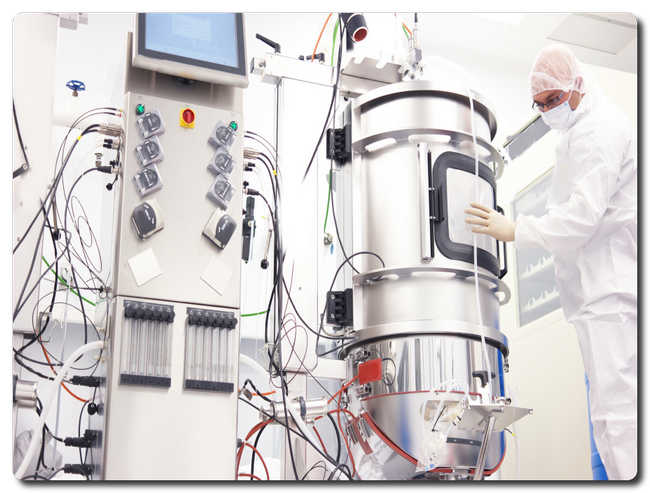
Current pharma issues
Drugs are currently produced according to validated processes, following precise workflows. Once the production of a drug is assigned to a manufacturing line, the steps for production are defined in a document called Master Batch Record (MBRs).
The MBRs make it easy to repeat the production of the same drug, but changing the production configuration or product volume requires alterations to the validated processes. Ultimately, this comes at a cost and presents obstacles to innovation and flexibility.
Here, equipment skids — like a single-use bioreactor — need to be treated as bespoke units when connected to control systems. This places automation on the critical path for facility design, build and reconfiguration, although biotech companies would exchange skids according to different manufacturing requirements.
The modular way
Ideally, pharma manufacturers should have a set of modules that perform a specific function, like a filter, a pump or more complex devices such as a single-use bioreactor or a granulator. This allows biotech companies to reconfigure the assembly line by simply connecting different modules together to make a product, before replacing them with others from a different supplier.
Providers must, therefore, enhance interoperability to reduce equipment installation time from months to weeks, or even days, depending on the installation scenario. Of course, users should also be mindful that this concept must support procedures reducing the internal validation effort.
However, this requires the following: a common communication language, a common descriptive model of the various devices, a guided procedure to make configuration changes in the system while maintaining the validation status, and software systems capable of orchestrating the various modules.
In fact, NAMUR, an international association of user companies in the process industry for automation technology, supports this plug-and-play approach by defining Module Type Package (MTP) concept. The model allows for more flexibility, by enabling the quick assembly and disassembly of systems from different vendors in the architecture. It also facilitates better scalability than previous models by ensuring that the data can be reorganized and presented in a way that is beneficial to whoever is looking at it.
Data challenges
Innovations of this kind pose considerable challenges, especially for machine builders and software technology providers.
From an automation software perspective, MTP requires a Process Orchestration Layer (POL) to communicate with automation systems from different vendors (Process Equipment Assembly – PEA). But today, classical distributed control systems (DCS) and ISA88 Batch Control engines are designed to operate within a single hardware product family, limiting the interoperability.
Using the MTP approach, PEAs from different manufacturers can instead be integrated into a single POL via an import configuration wizard. From the POL level, it is possible to create and run an ISA88 batch recipe using phases from the different PEAs, Such as an approach requiring an open, flexible and modular control system.
This approach also requires integration of IT systems. This is because it communicates in a transactional, message-oriented way with automation layers dealing with events in real time and data analytics systems, requiring large amounts of data to be stored and exchanged bidirectionally.
In this new scenario, open middleware platforms that provide process orchestration, connectivity services, message brokers, data contextualization, data modelling and data storage play a crucial role. Thankfully, COPA-DATA’s automation software platform, zenon, supports open digitalization in both green and brown fields.
In fact, it is software like this that allows pharmaceutical companies to front the more frequent changes in production required. With flexibility needed more than ever, automation software like zenon enables modular production for processes to become flexible, allowing manufacturers produce a variety of drugs on the same production line — COVID-19 or not.
About COPA-DATA
COPA-DATA is the manufacturer of the zenon® software platform, used in the manufacturing and energy industries for the automated control, monitoring, and optimization of machines, equipment, and power supplies. Founded by Thomas Punzenberger in 1987 and headquartered in Salzburg, Austria, the independent, family-owned company employs approximately 285 workers around the globe. The distribution of software on an international scale is made possible through the company’s eleven subsidiaries and numerous distributors. In addition, more than 270 certified partner companies ensure efficient software implementation for end users in the food & beverage, energy & infrastructure, automotive, and pharmaceutical industries. In 2019, COPA-DATA generated turnover of EUR 51 million.
About zenon
zenon is a software platform from COPA-DATA for manufacturing and the energy industry. Machines and equipment are controlled, monitored and optimized. zenon’s particular strength is open and reliable communication in heterogeneous production facilities. Open interfaces and over 300 native drivers and communication protocols support the horizontal and vertical integration. This allows for continuous implementation of the Industrial IoT and the Smart Factory. Projects with zenon are highly scalable.
zenon is ergonomic, both for the engineer and for the end user. The engineering environment is flexible and can be used for a wide range of applications. The principle of “setting parameters instead of programming” helps engineers to configure projects quickly and without errors. Complex functions for comprehensive projects are supplied out-of-the-box to create intuitive and robust applications. Users can thereby contribute to increased flexibility and efficiency with zenon.
Green energy lowers CO2 emissions dramatically
The Lesjöfors companies keep working on their sustainability objectives, where lower CO2 emissions are one focus area. Velleuer in Germany is a good example of how a transition to a green energy mix can lower emissions by more than half, fast and easy.
 Ten years ago, the German Lesjöfors company Velleuer certified to the environmental management standard ISO 14001. Since then Velleuer constantly monitors the environmental effects of their output and explores potentials to improve. In 2016, the company succeeded in reversing the negative trend with rising production-related CO2 emissions, even though production volumes increased. To take in energy sources with less environmental impact was the solution.
Ten years ago, the German Lesjöfors company Velleuer certified to the environmental management standard ISO 14001. Since then Velleuer constantly monitors the environmental effects of their output and explores potentials to improve. In 2016, the company succeeded in reversing the negative trend with rising production-related CO2 emissions, even though production volumes increased. To take in energy sources with less environmental impact was the solution.
Sustainability focus
In 2020, five years later, the opportunity had come to lower the CO2 emissions even further. With the conversion to green electricity, a further annual potential of reducing almost 300 tons of CO2 has opened up. This means an emission reduction of more than 60 per cent* thanks to certified green energy, produced with a zero emission guarantee.
Frank Jahn, MD of Velleuer, comments on the company’s sustainability focus:
“We are happy this opportunity came up and March 2020 was the right time for us to make a transition at a reasonable cost. For further steps, we are monitoring new opportunities according to the Greenhouse Gas Protocol providing standards for business and utilizing “Eco cockpit”, a free and easy-to-use online platform. Currently, we have completed the analysis on Scope 1 and Scope 2. In 2022, Scope 3 will come, when we broaden to the business field of procurement.”
*on Scope 1 and Scope 2 GHP Protocol
Charging stations at the premises
Velleuer also encourages the idea of emission-free local mobility. The company has installed both a charging station for employees´ electrical bikes, and a 2 x 22 kW wall box where coworkers can charge their electrical vehicles as well as company cars.
“To make it easier taking the bike to work does not only make a valuable contribution to lower air pollution, it also improves our employees’ health so it is a huge win-win for all parts”, says Frank Jahn.
The Lesjöfors Group provides the widest range of springs and pressings to customers in diverse industries across the world. With a unique expertise in high technological, custom-made solutions and a flexible manufacturing capacity, Lesjöfors is the premier partner for all spring requirements. Lesjöfors, owned by Beijer Alma a listed company on the Stockholm Stock Exchange, comprises almost 40 manufacturing and sales companies in many countries. As a long-term and committed spring innovator, the Group continuously grows with a good profitability, both organically and by acquisitions.
